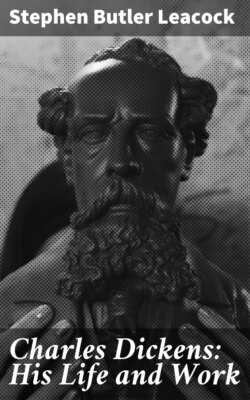Charles Dickens: His Life and Work

Реклама. ООО «ЛитРес», ИНН: 7719571260.
Оглавление
Стивен Ликок. Charles Dickens: His Life and Work
Charles Dickens: His Life and Work
Table of Contents
CHAPTER I. THE CHILDHOOD AND YOUTH OF CHARLES DICKENS
CHAPTER II. MR. PICKWICK TAKES THE WORLD BY STORM
CHAPTER III. BOZ CONQUERS ENGLAND
CHAPTER IV ‘BOZ’ VISITS AMERICA 1842
CHAPTER V. YEARS OF SUCCESS 1842-1847
CHAPTER VI. FLOOD TIDE (1845-1850)
CHAPTER VII. BLEAK HOUSE AND SOCIAL REFORM (1850-1854)
CHAPTER VIII. DICKENS AS AN EDITOR (1854-1857)
CHAPTER IX. DICKENS SEPARATES FROM HIS WIFE (1858)
CHAPTER X. DICKENS TAKES THE PLATFORM (1858-1865)
CHAPTER XI. THE SECOND VISIT TO AMERICA
CHAPTER XII. CLOSING IN—THE CLOSE (1870)
CHAPTER XIII. THE MYSTERY OF MORE THAN EDWIN DROOD
EPILOGUE
CHRONOLOGY
INDEX
Отрывок из книги
Stephen Butler Leacock
Published by Good Press, 2021
.....
Dickens, when he reported at Doctors’ Commons, was aged eighteen,—nineteen when he left it. The law itself as a career meant nothing to him: his work was a task and nothing more, but illuminated and relieved his abiding appreciation of the comic side of anything serious. But life was opening in front of him. He lived, still with his parents, at No. 18 Bentinck Street; had many friends and acquaintances and went out and about in what was not society with a capital S, but was at any rate social company. It was not unfitting that later on Dickens should have made David Copperfield’s Dora (famous among the heroines of fiction) the daughter of Mr. Spenlow of Doctors’ Commons. For it was in his days at the Commons that he met his own Dora and fell as immediately and as hopelessly in love as David did. Of this ‘Dora’ one must speak in a later chapter. Suffice it for the moment to say that she was separated in station from young Charles by one of those nice gradations of social status familiar in England,—in the England that was,—but indistinguishable from a distance. The shabby-genteel status of the Dickens family, their lack of prospects and their want of ‘class’, put them a cut below the Beadnells. Young Maria’s family saw to it that Dickens was not encouraged; and that a little later, absence and distance should terminate the whole connection. Henceforth, for twenty years, Maria was to Dickens like the lost Annabel Lee to Edgar Allen Poe. Pity that she didn’t stay lost. The history of literature would have been spared one of its meanest episodes.
But not even a broken heart can check the ardour of a body of nineteen. Dickens after all had the sharp spur of necessity and with that plenty of other interests. The ‘self-improvement’ idea had struck him hard. He read and studied in the British Museum. And more than all, there dawned upon his impressionable mind the glittering of the stage. From youth to age everything dramatic fascinated Charles Dickens. From his boyhood he haunted the cheap and popular theatres of the London of that day. Even in his Wellington House days he took the lead in getting up amateur theatricals, a pursuit and a hobby of which he never tired. Had he not turned into a writer, he would inevitably have become an actor. His public ‘readings’, later on, were largely histrionic performances, which held his audiences gripped by the mesmeric power of the presentation. As Dickens ‘read’, the audience saw not Charles Dickens beside a desk but the crouching figure of the murderer Bill Sikes, or the glorious comicality of Mr. Weller.
.....